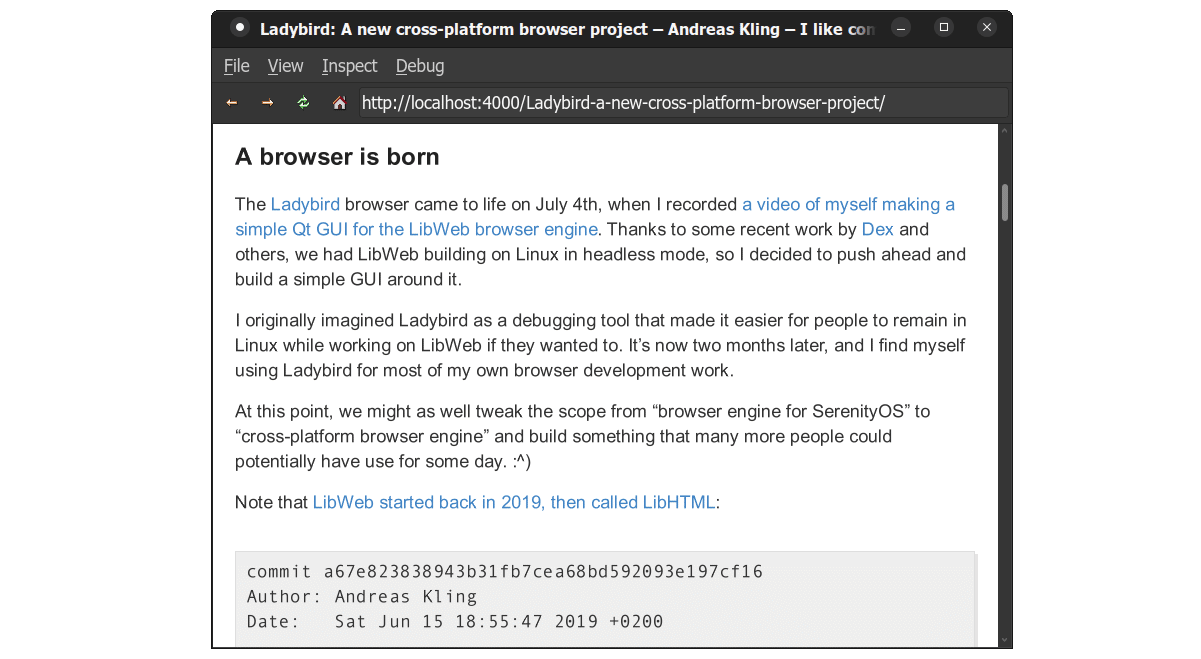
Ladybird browser, based on SerenityOS LibWeb and LibJS engines.
Recently SerenityOS operating system developers unveiled the introduction of its cross-platform web browser called «Lady Bird» based on the LibWeb engine and the LibJS JavaScript interpreter, which have been developed by the project since 2019.
It is worth mentioning that building a new browser from scratch is impossible without the commitment of large funds and the collaboration of many people over many years. The head behind the Ladybird project proves otherwise with the new open source cross-platform GUI browser implemented in C++.
I would love to have enough money to pay others to work at Ladybird one day. At the moment, I make enough to support my own family, but if things grow beyond the point where I'm comfortable, I'll consider restructuring so I can hire more help.
The initiative in the early stage revives the debate on the future possibility of seeing the hegemony of Google Chrome challenged.
The graphical interface is based on the Qt library and it is designed in a classic style and supports tabs. The browser is built using its own web stack, which, in addition to LibWeb and LibJS, includes a library for rendering text and 2D graphics LibGfx, a regular expression engine LibRegex, an XML parser LibXML, an intermediate code interpreter WebAssembly (LibWasm) , a library for working with Unicode LibUnicode, the LibTextCodec text encoding conversion library, the Markdown parser (LibMarkdown), and the LibCore library with a common set of useful functions, such as time conversion, I/O, and MIME type handling .
“SerenityOS browser now passes Acid3 test! To my knowledge, we are the first new open source browser to reach this milestone since the initial test release. It has been a team effort during the last two weeks and I am very proud of all those who have contributed”, announces the person in charge of the project. The success of the Acid3 test means that development work on this browser has reached a stage where it would have been rated very good around 2010. The project is two years and three months into development.
The browser supports all major web standards and successfully passes Acid3 tests, in addition to having support for HTTP and HTTPS protocols. Plans for the future include the implementation of multithreaded support, where each tab is processed in a separate process, as well as performance optimizations and the implementation of advanced features such as CSS flexbox and CSS grid.
The project was originally created in July as a Linux-based container to debug the web stack of the SerenityOS operating system, which develops its own SerenityOS browser. But after some time it became clear that the development went beyond the debugging utility and can be used as a normal browser (the project is still under development and not ready for daily use). The web stack has also evolved from SerenityOS-specific development to a cross-platform browser engine.
“Please note that we are only at the beginning of development and that many functionalities of the web platform are missing or buggy. It will be a long time before Ladybird is ready for daily sailing. We are still in the "make it work" part of the development cycle. As such, we tend to focus more on fixing and supporting features than on optimizing. Performance work is done primarily at the architectural level, although specific optimizations are also made that alleviate particular pain points.
For those interested in learning more about the Ladybird web browser project and its engine, you should know that the code is written in C++ and is freely available under the 2-clause BSD license, and it is mentioned that the builds support Linux, macOS, Windows (WSL), Android, and Haiku.
You can check the details from the original post on the following link.